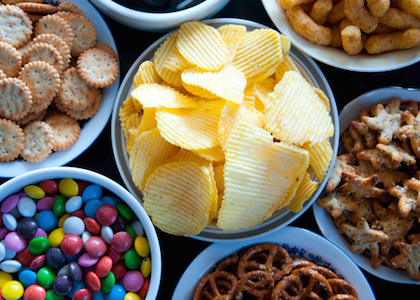
Addicted to Junk Food? It’s Not Your Fault
By Claire Georgiou, Reboot Naturopath, B.HSc ND
As a culture we eat enormous amounts of processed food! In the US, 1 in 3 adults and 1 in 5 children are considered clinically obese. And in just a few short weeks, US homes will be filled with Halloween candy that most can’t resist. People often blame lack of will power on why they can’t say no to junk food. There is more than meets the eye on this one and a whole lot of science!
There are specialised food-science experts who engineer processed foods to deliver the right amount of salt + fat + sugar and crunch to disrupt the body’s natural controls on overeating to make people feel hungrier and unsatisfied.
These specialised food formulas encourage people to overeat processed foods with a significant desire for more. There is an exact science driven by large studies on addictive food behaviours, marketing practices, finding the right food combinations and specialised taste sensations that encourage people to eat and crave junk foods, these include:
- ‘The bliss point’ – If you balance the right amount of salt-to-fat-to-sugar-to-crunch it will create what the food industry calls ‘the bliss point’, the ultimate food sensation that drives you to keep going back for more.
- ‘The mouth feel’ – This is the right balance of aroma, moisture, and gumminess combined with a general mouth sensation.
- ‘The colour and visual appeal’ – The colour and look of the food or drink also has a powerful effect on the desire for increased consumption.
- ‘The crunch point’ – There is also a formula for the perfect crunch point, no more than 4 pounds of pressure per square inch to create a satisfaction that is short lived so you want to do it again!
- ‘The vanishing caloric density’ – This involves food melting in your mouth, i.e. cheetos. This tells the brain you are not getting many calories so you consume a larger amount; these foods do not signal to the brain that it has had enough. Thus eating more!
Why Potato Chips are King of Processed Foods
Potato chips, sodas and many other processed food products you see in the grocery stores owe their success to complex formulas that stimulate the taste buds enough to be tempting but doesn’t have a distinct, overriding single flavour that tells the brain to stop eating.
Studies have demonstrated that potato chips are the all-time perfect addictive food – it provides all the factors that reward the pleasure centres. This has awarded the potato chip as being one of the most probable weight gaining foods.
Marketing Doesn’t Help
Our natural satiety gauges and hormones are all very sensitive and can be easily disrupted by the wrong foods. Marketing and product placement has a great influence on our appetite control – bright colourful packaging at eye level combined with pictures of food will attract our attention. When we see food it naturally stimulates hungry hormones and appetite in the preparation for eating. Historically seeing food meant it was available and should be eaten because we may not see it for a while, so eat up!
When we are constantly bombarded with pictures of food, this stimulates our desire to eat. Often this reaction is subconscious. We may be watching TV then all of a sudden we are hungry and off we go with a specific craving!
Don’t Be Mindless
Studies show that people consume more calories while watching TV due to mindless eating combined with heavy junk food advertising. Advertiser’s present happy, healthy people consuming processed foods which tells our subconscious, “I will be happy and healthy if I eat that product”, even when we know this isn’t the truth.
There is a conscious effort by the food manufacturers in their food labs, marketing meetings, product placement and grocery-store aisles to get people hooked on foods that are convenient and inexpensive.
One snack food company had a research complex of 500 chemists, psychologists and technicians who conducted research that cost up to $30 million a year focusing on questions of crunch, mouth feel and aroma for each of their snack food items to decipher how they could get people to eat more snacks. Imagine what could be done with this budget per year if it could be used to educated people on how food impacts the way they feel, look and on long-term health.
Don’t Be Fooled
It has been said that the ‘processed-food industry should be seen as a public health menace, the toll taken on the public health by a poor diet rivals that taken by tobacco’. Most people view cigarettes as a huge public health concern while junk food is considered essentially, harmless.
Food manufacturers are now also identifying that people are becoming more health conscious so they are concentrating their efforts on how to trick people into eating snacks without guilt. Using different packaging, lower salt so people eat more with less guilt and using words like toasted instead of fried. So don’t be fooled!
What to Know before Reaching for the Chips
Processed foods are scientifically formulated to switch off our natural satiety gauges and increase mindless eating, hunger and cravings (they should put that on the packet).
One thing we know is, the less processed foods you eat the less you desire them. When junk food is restricted i.e. during a Reboot, with little more than a few days your cravings and natural satiety gauges will improve. This is where the Reboot has a powerful effect on your long-term health. A Reboot promotes and supports for a period of time only 100% natural plant foods to allow your natural hormones and hunger gauges to realign themselves thus improving your long-term health and success.